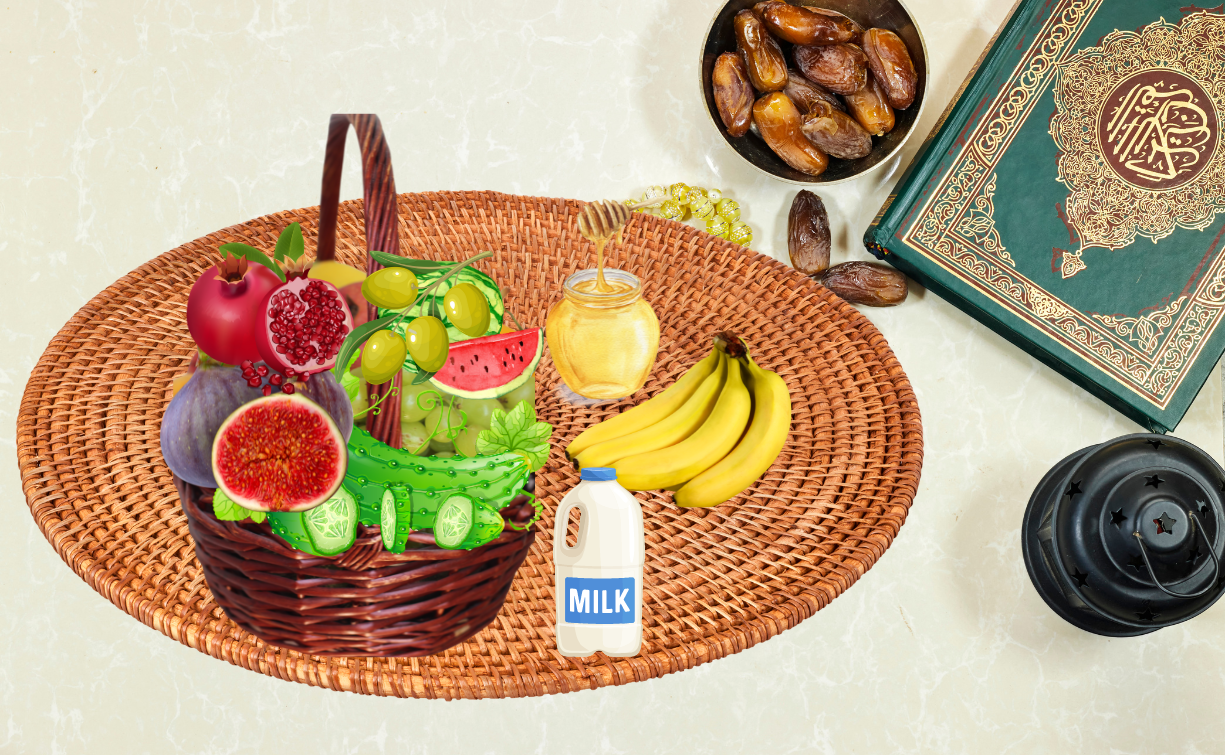Can you believe that ordinary food items like ‘bananas’ and ‘lentils’ are mentioned in the Quran? It’s amazing that we are rewarded for saying the names of the foods in the Quran. Similarly, some foods were narrated by the companions in hadeeths, which we can find in texts like Sahih Bukhari. Clearly, it is important to learn about such foods and consume them, to enhance both our physical and spiritual well-being. In this article, we will illustrate the wisdom behind mentioning foods in both the Quran and sunnah using ayahs and authentic examples from the hadeeths.
In the Sunnah:
There are various reasons why foods are mentioned in hadeeths. Firstly, the Sahaba RA narrated what the prophet (ﷺ) ate to demonstrate his liking for it. For example, Anas ibn Malik RA said: “I saw Allah’s Messenger (ﷺ) picking the pieces of gourd from around the dish, and since then I have kept on liking gourd” [Sahih al-Bukhari 5439]. Moreover, Aisha RA reported that he (ﷺ) would eat melon with ripe dates, saying: “The heat of this [dates] neutralizes the coolness of that [melon]” [Sunan Abi Dawud 3832]. She also reported that the prophet (ﷺ) said, “The best of condiments or toppings is vinegar.”
On the other hand, there were certain things the prophet (ﷺ) disliked eating. Once, a mastigure was brought to the prophet (ﷺ) and he stretched his hand out to take it, but when he was told what it was, he withdrew his hand saying that he disliked it [Sahih Bukhari 5440].
Secondly, etiquettes related to consuming foods have been prescribed in the narrations. For example, the prophet (ﷺ) said: ‘Rinse your mouths after drinking milk for there is some greasiness in it” [Sunan Ibn Majah 498]. He also said, “…Whomsoever Allah gives milk to drink should say ‘Allahumma barik lana wa zidna minhu’ (O Allah, bless us in it and grant us more)” [Sunan Tirmidhi 3455]. With regards to dates, it’s narrated that he (ﷺ) was once eating dates by putting the pits between his fingers and holding his forefinger and middle finger together” [Sahih Muslim 3/1615]. Also, the prophet (ﷺ) used to eat an odd number of dates [Sahih al-Bukhari 953].
Third, there are specific foods mentioned in hadiths to indicate that they have healing properties. Examples are black seed, honey, and milk. The prophet (ﷺ) said, “Use this black seed. For indeed it contains a cure for every disease except As-Sam and As-Sam is death” [Jami at Tirmidhi 2041]. Similarly, he (ﷺ) said, “healing is in three things: a gulp of honey…” [sahih al Bukhari 5680]. It is also narrated that the prophet (ﷺ) ordered some people to drink the milk and urine of his camels (as a medicine), so they did till their bodies became healthy [Sahih al-Bukhari 5686].
Fourth, throughout the sunnah, the prophet (ﷺ) has encouraged people to consume blessed foods such as olives and dates. The prophet (ﷺ) said, “Eat olive and use its oil, for indeed it is a blessed tree” [Jami at-Tirmidhi 1851]. He also said, “whoever eats seven ‘ajwah dates in the morning, will not be harmed by any poison or witchcraft that day” [Al-Bukhari 5445]. Similarly, the presence of some foods brings barakah in the house. For example, the prophet (ﷺ) said, “…and no house will ever be poor in which there is vinegar” [Sunan Ibn Majah 3318]. On another occasion, he said, “The household which has dates will not go hungry” [Sahih Muslim 5305].
In the Quran:
A lot of the foods discussed above are also mentioned in the Quran such as honey, milk, dates, and olives. Allah stated: “With it He produces for you ˹various˺ crops, olives, palm trees, grapevines, and every type of fruit” [16:11]. And in another surah: “˹There are˺ also gardens of grapevines, olives, and pomegranates” [6:99].
Furthermore, the request of Bani-Israel for different types of food is also stated: “So ˹just˺ call upon your Lord on our behalf, He will bring forth for us some of what the earth produces of herbs, cucumbers, garlic, lentils, and onions” [2:61].
The Quranic references to these foods invite us to pause and reflect. In surah al-Nahl, Allah said after mentioning foods: “Surely in this is a sign for those who reflect” [16:11]. Indeed, the foods referred to in the Quran are signs of Allah’s mercy and power. On many occasions, He illustrates His favours and blessings upon us through stating foods, and then reminds us to thank Him, or to worship Him and not commit shirk.
For example, after citing palm trees, olives and pomegranates, Allah said: “Eat of what Allah has provided for you and do not follow Satan’s footsteps” [6:142]. And in another Surah, “and sends down rain from the sky, causing fruits to grow as a provision for you. So do not knowingly set up equals to Allah ˹in worship˺” [2:22].
Isn’t it amazing that the food we consume can become a means of connection with our Creator? To sum up, if we think about a food’s religious value such as being a sunnah to eat, we may get reward eating it. I invite you to try some of these foods as it is very beneficial to consume them for their nourishing properties and sanctity.





